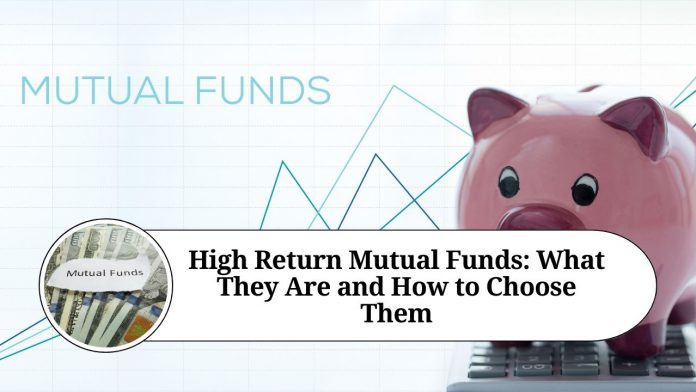Investing in mutual funds has become increasingly popular as a way to build wealth and achieve long-term financial goals. While there are a variety of mutual funds available, some offer higher returns than others. In this blog post, we’ll explore what high return mutual funds are and how to choose the best ones for your investment strategy.
What are High Return Mutual Funds?
High return mutual funds are funds that have historically generated higher returns than the average mutual fund. These funds typically invest in assets such as stocks, bonds, and real estate investment trusts (REITs) that have the potential for higher returns but also come with higher risks.
It’s important to note that high return mutual funds do not guarantee a high return in the future. Past performance does not guarantee future results, and there is always a risk of losing money when investing in any mutual fund.
How to Choose High Return Mutual Funds
Choosing the right high return mutual fund for your investment strategy can be challenging. Here are some factors to consider when selecting a high return mutual fund:
- Historical Performance: Look at the fund’s historical performance over the past five to ten years. While past performance doesn’t guarantee future results, it can give you an idea of how the fund has performed in different market conditions.
- Expense Ratio: The expense ratio is the annual fee that the mutual fund charges to cover its operating expenses. Lower expense ratios mean more money stays invested, which can lead to higher returns over time.
- Investment Style: Different mutual funds have different investment styles, such as growth, value, or income. Choose a mutual fund that aligns with your investment goals and risk tolerance.
- Manager Experience: Look at the fund manager’s experience and track record. An experienced manager who has consistently outperformed the market can be a good indication of future success.
- Diversification: A well-diversified mutual fund can help reduce risk by investing in a variety of assets. Look for mutual funds that invest in different sectors, industries, and geographic regions.
Examples of High Return Mutual Funds
Here are a few examples of high return mutual funds to consider:
- Vanguard Growth Index Fund (VIGRX): This mutual fund invests in large-cap growth stocks and has a low expense ratio of 0.17%. Over the past 10 years, it has generated an average annual return of 16.3%.
- T. Rowe Price Blue Chip Growth Fund (TRBCX): This mutual fund invests in large-cap growth stocks and has an expense ratio of 0.70%. Over the past 10 years, it has generated an average annual return of 18.3%.
- Fidelity Contrafund (FCNTX): This mutual fund invests in large-cap stocks with a focus on undervalued companies. It has an expense ratio of 0.82% and has generated an average annual return of 15.5% over the past 10 years.
Conclusion
High return mutual funds can be a great way to achieve long-term financial goals, but it’s important to choose the right fund for your investment strategy. Consider factors such as historical performance, expense ratio, investment style, manager experience, and diversification when selecting a high return mutual fund. Remember, past performance does not guarantee future results, and there is always a risk of losing money when investing in any mutual fund.
Read more useful content:
- How to invest in mutual funds
- Best Technology Mutual Funds
- All about mutual funds-types & importance
- The Power of SIP Investment in Mutual Funds
Frequently Asked Questions (FAQs)
Q: What are high return mutual funds?
A: High return mutual funds are mutual funds that have historically generated higher returns than the average mutual fund. These funds typically invest in assets such as stocks, bonds, and real estate investment trusts (REITs) that have the potential for higher returns but also come with higher risks.
Q: How do I choose high return mutual funds?
A: To choose the right high return mutual fund for your investment strategy, consider factors such as historical performance, expense ratio, investment style, manager experience, and diversification. Look at the fund’s historical performance over the past five to ten years, the expense ratio, investment style, manager experience, and whether the fund is well-diversified.
Q: Do high return mutual funds guarantee a high return?
A: No, high return mutual funds do not guarantee a high return in the future. Past performance does not guarantee future results, and there is always a risk of losing money when investing in any mutual fund.
Q: What is the difference between high return mutual funds and other mutual funds?
A: High return mutual funds are mutual funds that have historically generated higher returns than the average mutual fund. They typically invest in assets that have the potential for higher returns but also come with higher risks. Other mutual funds may invest in a variety of assets with varying levels of risk and potential returns.
Q: Are high return mutual funds suitable for everyone?
A: No, high return mutual funds may not be suitable for everyone. These funds typically come with higher risks and are better suited for investors who have a higher risk tolerance and a long-term investment horizon.
Q: Can high return mutual funds lose money?
A: Yes, high return mutual funds can lose money. These funds invest in assets that have the potential for higher returns but also come with higher risks. It’s important to understand the risks involved and to choose a high return mutual fund that aligns with your investment goals and risk tolerance.
Q: Can I invest in high return mutual funds through a retirement account?
A: Yes, you can invest in high return mutual funds through a retirement account such as a 401(k) or IRA. It’s important to understand the tax implications of investing in mutual funds through a retirement account and to choose a fund that aligns with your investment goals and risk tolerance.




















